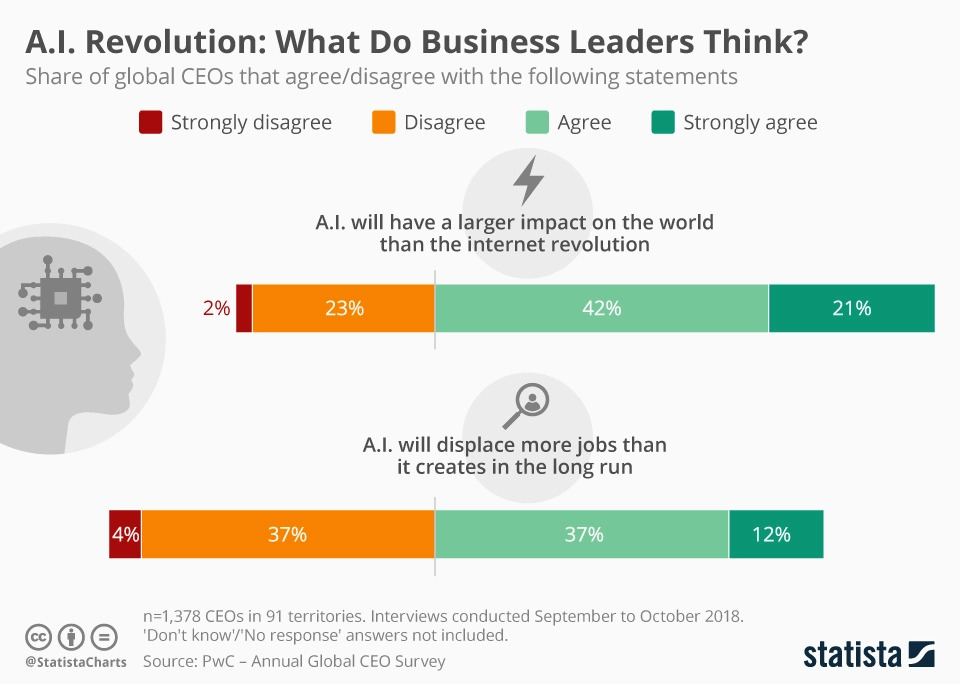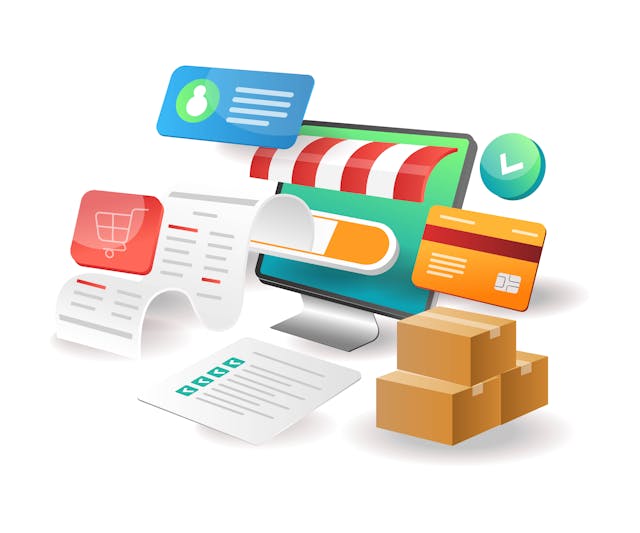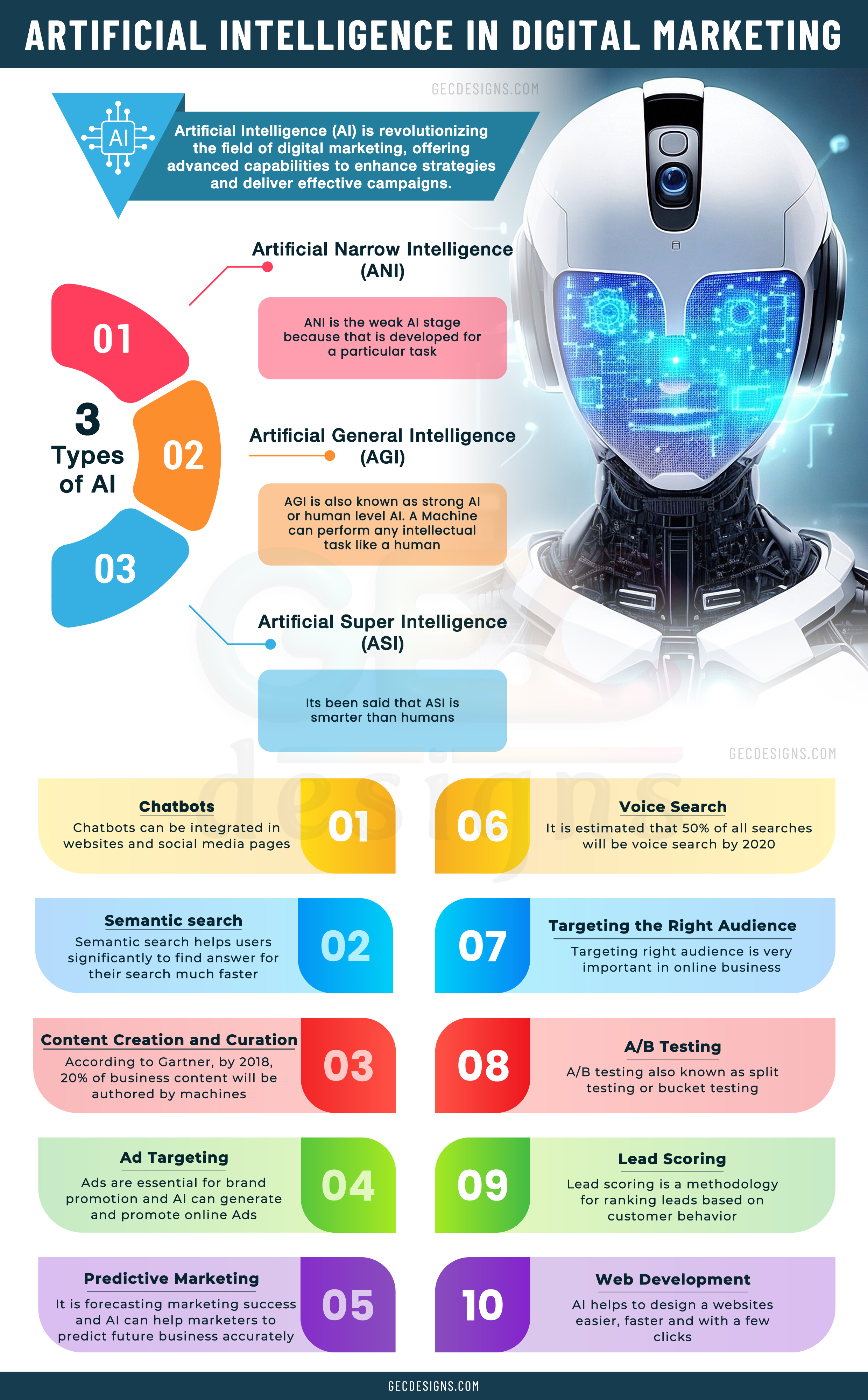Impact of Artificial Intelligence on Digital Marketing
What is Artificial Intelligence?
Artificial intelligence refers to the development of intelligent machines that possess the ability to think and react in ways similar to humans. The term 'Artificial Intelligence' was coined by John McCarthy, one of the pioneering founders of this field of study. With its advanced capabilities, Artificial Intelligence has the potential to perform tasks with remarkable accuracy.
Artificial Intelligence has been hailed as the harbinger of the next industrial revolution, with widespread belief that it holds the key to solving many of the challenges and problems that currently confront our world. Moreover, AI is anticipated to tackle potential issues that may arise in the future. The immense potential of Artificial Intelligence is expected to drive the creation of new industries, technologies, and transformative environments.
Research firm Gartner says that "Artificial Intelligence will Create 2.3 Million Jobs in 2020 While Eliminating 1.8 Million". Read more at Artificial Intelligence Will Create More Jobs Than It Eliminates.
 You will find more infographics at Statista
You will find more infographics at Statista
84% of marketers believe using AI enhances marketing functions in real-time.
Next, we will explore the different categories of artificial intelligence.
3 Types of artificial intelligence
- Artificial Narrow or Weak Intelligence (ANI/WAI) - This type of AI is designed to perform a specific task or a narrow range of tasks, typically with a high level of accuracy within its specific domain. ANI/WAI lacks general intelligence and is not capable of autonomous decision-making outside of its predefined scope. Examples of ANI/WAI include voice assistants like Siri, recommendation algorithms, and image recognition systems.
- Artificial General Intelligence (AGI/SAI) - This type of AI possesses a level of intelligence comparable to human intelligence and is capable of understanding, learning, and applying knowledge across a wide range of tasks and domains. AGI/SAI has the ability to think, reason, and make decisions autonomously, exhibiting cognitive capabilities at or beyond human level. AGI/SAI, if achieved, could potentially perform any intellectual task that a human can. However, true AGI/SAI is still a hypothetical concept and has not yet been fully realized.
- Artificial super intelligence (ASI) - This type of AI surpasses human intelligence and possesses capabilities that are vastly superior to human intelligence in all aspects. ASI, if achieved, would have the capacity to outperform humans in virtually all domains of intellectual tasks and possess unprecedented levels of problem-solving, decision-making, and creative abilities. ASI is considered highly speculative and its potential implications, benefits, and risks are the subject of extensive debates and discussions among researchers, ethicists, and policymakers.
In this article, our focus is on examining the profound impact of Artificial Intelligence on the field of digital marketing. The pervasive influence of AI has led to significant transformations in digital marketing, and we will delve into some of the effects that are anticipated to shape the landscape of this field in the years to come.
-
Chatbots
-
Semantic search
-
Content Creation and curation
-
Ad targeting
-
Predictive marketing
-
Voice search
-
Target right audience
-
A/B testing
-
Lead scoring
-
Web development
1. Chatbots
Chatbots are computer programs that utilize Artificial Intelligence (AI) and Natural Language Processing (NLP) to interact with online customers, including completing orders on their behalf. Chatbots can be seamlessly integrated into websites and social media pages. They enhance engagement, provide round-the-clock customer support, and have the ability to handle multiple customer interactions simultaneously.
In addition, chatbots are capable of providing instant responses to customer queries through chat-based interactions or voice-based interactions. Numerous online businesses have already adopted chatbots to deliver enhanced customer support. Remarkably, as per Gartner, a staggering 85% of customer interactions were handled without human intervention in 2021. The remarkable aspect is that, in many instances, customers may not even realize that they are interacting with a machine due to the seamless and sophisticated nature of chatbot interactions.
Apple does have its virtual assistant called Siri, which is an AI-powered voice recognition system that allows users to interact with their Apple devices using voice commands. Siri is integrated into various Apple products, including iPhones, iPads, Macs, Apple Watches, and HomePods, and is designed to perform tasks such as answering questions, setting reminders, sending messages, and playing music, among others. Siri is constantly evolving and being updated by Apple to enhance its capabilities and provide improved user experiences.
Google has developed and released multiple AI-powered chatbots and virtual assistants. Some of the notable ones include:
- Google Assistant: Google Assistant is a virtual assistant developed by Google that uses AI and natural language processing (NLP) to provide voice-based interactions with users. It is available on various devices, including smartphones, smart speakers, smart displays, and smartwatches, and can perform tasks such as answering questions, setting reminders, sending messages, making reservations, and controlling smart home devices.
- Dialogflow: Dialogflow, formerly known as API.AI, is a platform developed by Google that allows developers to create conversational interfaces, including chatbots, using natural language understanding (NLU) and machine learning technologies. Dialogflow is commonly used by businesses to build chatbots for customer service, sales, and other applications.
- Meena: Meena is a chatbot developed by Google Research as an AI language model. It is designed to generate human-like responses in conversations and engage in open-ended conversations on a wide range of topics. Meena uses deep learning techniques and large-scale language modeling to generate contextually relevant and coherent responses in conversations.
- Google Chatbot for Business: Google also offers a chatbot for businesses, which is designed to help businesses automate customer support, handle inquiries, and provide information to users. It uses AI technologies to understand and respond to user queries in a conversational manner.
2. Semantic search
Semantic search is a powerful tool that enables users to find answers to their search queries more quickly and effectively. Unlike traditional keyword-based search, semantic search employs advanced data searching techniques that focus on understanding the user's intent and contextual meaning behind a search query. This is achieved through AI-powered algorithms that are capable of deciphering the relationships between words and phrases in the query. Furthermore, machine learning techniques are employed to better understand user preferences and behavior based on their search history and persona. As a result, the quality of search results continues to improve over time, providing users with more relevant and accurate information.
It considers some factors like,
- User's search history
- Previously stored data
- Current location
- Spelling variations
- Seasonal trends
- Local information
- Synonyms
- Concept matching
- Time of search
The Evolution of semantic search
- Knowledge graph – May 2012
- Hummingbird algorithm - September 2013
- Rank brain –October 2015
- BERT - October 2019
Tips to optimize your site for semantic search
- Use Schema markup - It helps to index your content faster and it also helps search engines to understand a lot about your copy.
- Keywords - long-form7 keywords provide a more precise target. Use more related keywords within your content.
- LSI keywords (Latent Semantic Indexing) - Make sure to use LSI keywords in your Meta Description.
- Consider your audience - understand the demographics and psychographics of your target audience. Find out what your audience wants.
AI is the study and design of intelligent agents where an intelligent agent is a system that perceives its environment and takes actions that maximize its chances of success.
3. Content Creation and curation
Artificial Intelligence (AI) has become a pivotal element in the realm of content marketing, playing a crucial role in driving innovation and enhancing strategies to deliver effective marketing campaigns.
AI-powered Natural Language Generation (NLG) technology empowers marketers to automatically create content by transforming data into engaging narratives. With NLG platforms, data-specific content such as sports stories, stock updates, and financial reports can be written by AI, with the capability to produce up to 2000 articles per second. Leveraging AI in content creation not only enhances efficiency but also leads to more effective outcomes, resulting in compelling and relevant content for various marketing purposes.
In 2016, the content creation AI known as Wordsmith achieved a remarkable feat by generating a staggering 1.5 billion pieces of content. Among its notable use cases is creating financial reports for the Associated Press, showcasing the remarkable capabilities of AI in automating content generation at an unprecedented scale. Wordsmith's ability to produce high-quality written content demonstrates the significant advancements of AI in the field of content creation and its potential to revolutionize various industries, including journalism and media.
Content curation refers to the systematic process of gathering and organizing relevant information on a specific topic. In today's digital age, content curation has been augmented by Artificial Intelligence (AI) technologies. A prime example of content curation powered by AI is seen in e-commerce websites like Amazon, where personalized product recommendations are generated based on a user's browsing and purchasing history. This showcases how AI algorithms analyze user data to curate and present relevant content, enhancing the user experience and providing tailored recommendations. Such AI-powered content curation is transforming the way information is presented and personalized, making it a valuable tool in various industries for delivering relevant content to users efficiently and effectively.
As per research by McKinsey, a significant portion of Amazon's revenue, specifically 35%, is attributed to the success of its recommendation engine. This showcases the substantial impact and effectiveness of AI-powered content curation in driving sales and revenue for e-commerce platforms. The recommendation engine analyzes vast amounts of user data, leveraging AI algorithms to offer personalized product suggestions, thereby influencing customer purchasing decisions and contributing significantly to Amazon's overall revenue. This statistic underscores the importance of AI-driven content curation as a powerful tool for enhancing user engagement, driving sales, and ultimately boosting business success in the e-commerce industry.
OpenAI's ChatGPT, an AI-powered Natural Language Processing (NLP) tool, has experienced remarkable success, with an astounding achievement of reaching 100 million active users within just 2 months of its launch. This data exemplifies the rapid growth and widespread adoption of ChatGPT, reflecting its immense potential and popularity among users. The impressive user base highlights the value and impact of ChatGPT's AI-driven capabilities in various domains, showcasing the growing demand for advanced NLP technologies in today's fast-paced digital landscape.
ChatGPT has emerged as a versatile and powerful tool with potential impacts in various fields, including content marketing. Here are some ways ChatGPT is expected to influence the field of content marketing:
- Keyword research: ChatGPT can assist in keyword research for SEO and marketing campaigns. By utilizing its AI capabilities, ChatGPT can generate a list of potential keywords based on a seed keyword provided by the user. This can help content marketers and SEO professionals identify relevant keywords to target in their content creation and optimization efforts, ultimately improving their search engine rankings and driving targeted traffic to their websites. ChatGPT's keyword generation feature can save time and effort in the keyword research process, providing valuable insights for optimizing content and devising effective marketing strategies.
- Content Generation: ChatGPT's AI capabilities enable it to generate high-quality content for various purposes, including blog articles, social media posts, marketing campaigns, email marketing, and product descriptions. It can produce unique and engaging content that is tailored to the specific needs of the target audience.
Furthermore, ChatGPT can optimize content for search engines by incorporating targeted keywords, helping to improve search engine rankings and increase organic traffic. Its ability to create content at a large volume and quickly can significantly streamline content creation processes, saving time and effort for content marketers and allowing them to scale their content production efforts efficiently.
-
Content Optimization: ChatGPT can assist in analyzing and optimizing content for search engines, helping content marketers to create SEO-friendly content that performs well in search rankings. This can enhance the visibility and discoverability of content, driving organic traffic to websites and increasing brand exposure.
-
Social Media Management: ChatGPT can assist in managing social media content, generating social media posts, scheduling posts, and monitoring engagement. This can streamline social media marketing efforts, allowing marketers to efficiently manage and optimize their social media content strategy.
4. Ad targeting
Ads are essential for brand promotion and AI can generate and promote online Ads. It can generate or improve Ads content based on the user’s interests, preferences, likes, and dislikes.
Offering personalized ads is always a topmost priority for digital marketers, Am I right? Google Ad platforms already use artificial intelligence and machine learning to target the audience. AI can deliver ads to users based on their search history, previous purchase, demographics, interests, etc, and finally, AI can display the right ads to the right audience at right time. This will give a better ROI to advertisers.
According to eMarketer, 84% of digital display Ads in the US will be programmatic.
5. Predictive marketing
Predictive marketing is forecasting marketing success and AI can help marketers to predict future business accurately. Predictive analytics use data mining, machine learning, and artificial intelligence to analyze historical data to predict future trends.
When the user browses the internet every time AI collects the information related to the user’s online behavior and analyzes that data. This data reveals a lot of information like buying frequency and brand preferences of the user. Artificial Intelligence has the ability to understand the needs and preferences of the consumer with the data it has already analyzed. By segmenting the audience, AI helps companies to understand what their customers want. It helps to predict the purchasing behavior of your target customer.
Predictive analytics helps companies to manage their production plan, and it is based on demand and supply prediction.
According to narrative science, 44% of executives believe that AI’s most important benefit is decision making.
6. Voice search
In 2020, voice-based searches accounted for 50% of all searches. A recent study predicts that by 2022, 71% of consumers will prefer voice queries over typing. Furthermore, Google algorithms have advanced to the point where they can accurately understand human language with a 95% accuracy rate.
Voice search is an easier and quicker way to search for information. Isn't it? Voice search will change future SEO strategies so it is necessary for marketers to optimize their content with voice-friendly long-tail keywords. Optimize your site for local search and that is very important because the users say words like “near me” in voice search. Create web pages that provide direct answers to the questions because Voice search always looking for WH questions.
7. Target the right audience
Targeting the right audience at the right time with the right product is very important in online business. Google analytics powered by Artificial intelligence can segment the audience depends on location, demographics like age, gender, education, income, profession, etc, and psychographics like interest, preferences, attitudes, etc. It helps to decide which target audience is best for your product or service.
Artificial intelligence analyzes millions of data line item on a single user profile, that will help digital marketers to market the products to the various customer segments effectively.
AI also helps to create personalized email marketing campaigns. It can turn your general email, feels more personal and that can boost customer engagement. Do you know? According to Econsultancy, 74% of marketers said targeted personalization in emails increases customer engagement.
8. A/B testing
A/B testing also known as split testing or bucket testing. According to Techopedia, A/B testing is an online marketing tactic that comparing two versions of web pages to identify, which one is preferred by consumers. In another word which version of your web page generates more conversions or leads.
Artificial intelligence-based tools, test a bunch of hypothesis at a time and improve results much quicker and more efficiently than humans. Also, AI is used to increase the effectiveness of the Conversion rate.
Sentient Ascend platform allows you to test thousands of hypotheses simultaneously. It helps to find the top-performing variations faster.
9. Lead scoring
Lead scoring is a methodology for ranking leads based on customer behavior relating to their interest in product or service and their current place in their buying cycle. It helps to identify who is likely to engage or buy. No one wants to lose time with unqualified leads and it helps to focus on qualified leads. Companies can score leads by using terms like hot, warm, and cold
- Hot – A Hot lead is someone ready to buy.
- Warm – A warm lead is someone interested in your product or service.
- Cold - a person who does not show interest in your product or service.
Artificial intelligence can automatically prioritize real hot leads and it helps to improve sales productivity and proactively.
10. Web development
With the assistance of AI, website design has become easier, faster, and more efficient with just a few clicks. For instance, applications like Grid utilize artificial intelligence, specifically a tool named Molly, to create websites within minutes based on user-provided information such as images, page layout, text, calls-to-action, and more.
Similarly, Durable AI offers a rapid website building solution that creates a mobile-friendly website in under a minute, tailored to your location and business type. This AI-powered website builder automatically incorporates images, copy, fonts, colors, social media buttons, and a contact form. Additionally, you have the flexibility to customize each section of the design to perfectly align with your specific needs.
Here are some AI platforms that can be helpful in boosting your productivity
- Godmode.space is a cutting-edge tool designed to unleash the creative potential of generative agents - powerful AI algorithms that can generate unique outputs based on input data. Developed by FOLLGAD, this innovative tool requires JavaScript to be enabled in the user's browser for optimal performance. With Godmode.space, users can delve into the capabilities of generative agents and unlock new possibilities for creative exploration and experimentation.
- Beautiful.ai is an innovative generative AI presentation software designed for professional settings, capable of generating stunning presentation templates in mere seconds. With a vast selection of intelligent slide templates to choose from, creating and delivering impressive presentations has never been easier. According to Beautiful.ai, their software applies the principles of excellent design in real-time, effortlessly adapting your content into attractive, professional-looking slides.
- Introducing HeyGen, a cutting-edge AI tool that instantly generates videos in over 40 different languages with 300+ voices and 100+ AI-generated avatars. HeyGen is a powerful video platform designed to help you create engaging business videos using generative AI technology.
- Designer.Microsoft is an innovative AI-powered design tool that enables the creation of digital designs such as flyers, advertisement banners, logos, social media posts, website banners, and more. According to Microsoft, Designer.Microsoft is a cutting-edge graphic design application that empowers users to produce professional-quality social media posts, invitations, digital postcards, graphics, and other visual assets.
Conclusion
The rapid adoption of Artificial Intelligence across various industries is poised to revolutionize traditional business practices. With its ability to drive accuracy and speed, AI is transforming data management, information retrieval, computation, and cost-effectiveness in sectors such as finance and banking. Marketers are leveraging AI for data-driven decision making, optimizing campaigns, and identifying potential customers based on predictive analytics, leading to improved sales and customer satisfaction. The opportunities presented by Artificial Intelligence are reshaping the way businesses operate and unlocking new possibilities for enhanced efficiency and success.
” Everything we love about civilization is a product of intelligence, so amplifying our human intelligence with artificial intelligence has the potential of helping civilization flourish like never before – as long as we manage to keep the technology beneficial. - Max Tegmark, President of the Future of Life Institute

Rajanarthagi
Content writer and Marketer
An enthusiastic SEO expert, passion for digital marketing with two years of expertise in writing Digital Marketing and SEO content. She is a Master of Business Administration graduate from a reputed university in south India. Her passion for SEO and online marketing helps her to stay up to date with the trends and strategies. Follow her on social media sites, to stay up to date with SEO, and Digital Marketing, Updates. To contact Raji, visit the contact page.





